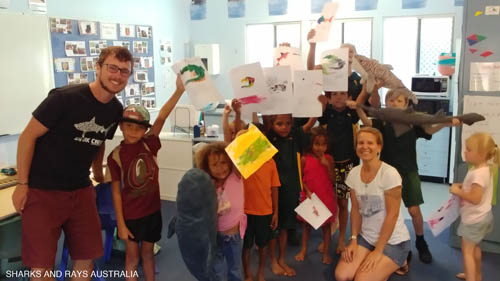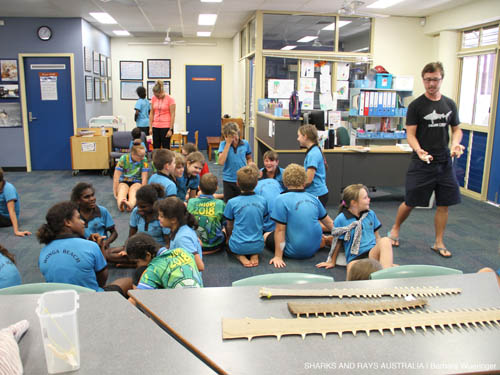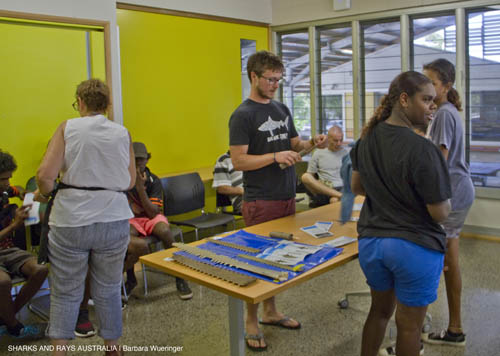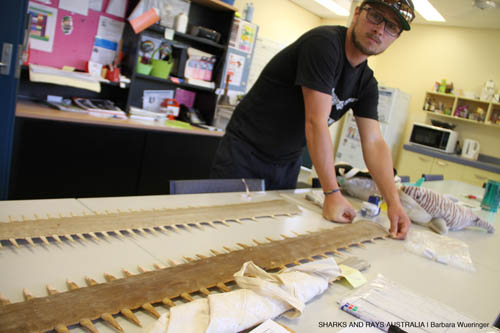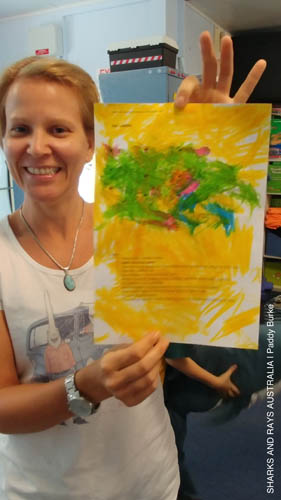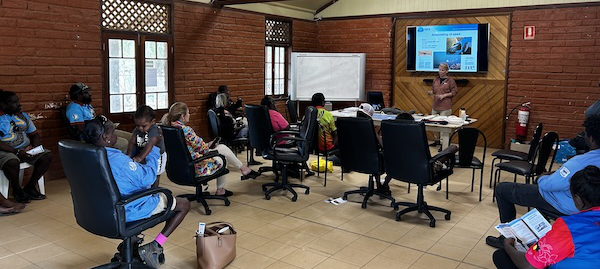
by Barbara | Aug 6, 2023 | Blog
by Veronika Biskis
Continuing our work with the Lama Lama Land and Sea Rangers, SARA was invited to provide training in sawfish monitoring for the Rangers and the local community in Coen, QLD in July. The entire journey was documented by the talented Don Silcock, who was not only capturing the trip, but delving into untold stories from Elders in the region.
The trip to Coen was a first for us – travel via plane! The SARA team is well versed in the two day trek up from Cairns in the troop-carrier, but with funding from the Engaging Science Grant received this year, we were able to hitch a ride on an 8-seater Cessna. Unsurprisingly, the Cape looks just as incredible from above, and is always the reminder for just how remote our work is.

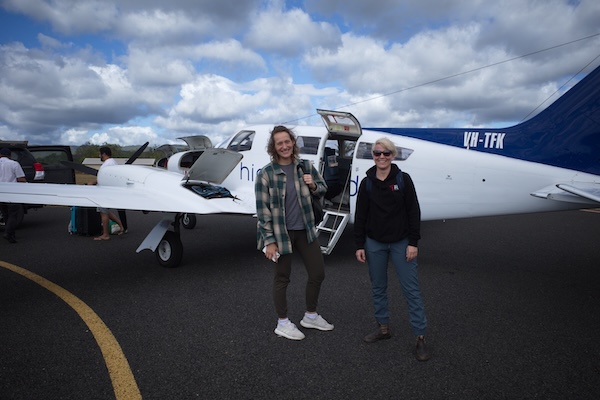
Figure 1: (L) The PDR from the Hinterland Plane (R) Nikki and Barbara at the Coen Airport
Alison Liddy of the Lama Lama Land and Sea Rangers organised a workshop with the Junior Rangers for the first evening. Dr Wueringer presented to some new and familiar faces on fundamental principles such as food webs, healthy ecosystems, as well as hands on techniques in field science. We are extremely lucky for the opportunity to talk about traditional and modern methods in caring for Country with the next generation of local scientists.
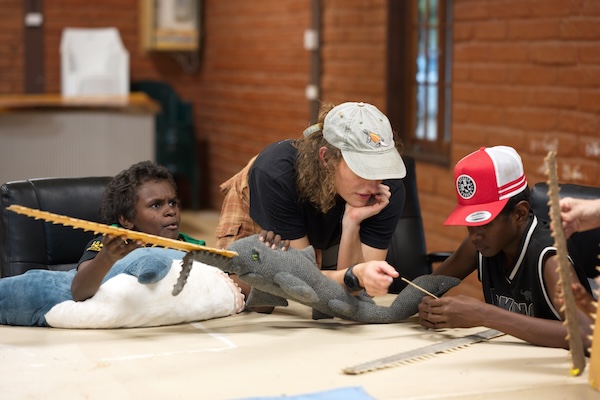

Figure 2: The junior rangers mastering sawfish ID and how to tag sawfish.
The second day was aimed at citizen scientists, recreational fishers, and the Rangers. Participants learned about sawfish biology, survey methods, and tagging. After the event, Elders shared stories of growing up in Coen and seeing sawfish in their youth. These rare examples of Local Ecological Knowledge (LEK) create real context in understanding changing environments. Don Silcock documented this connection to Country throughout. In the afternoon, we headed to the famous Exchange Hotel, where locals continued to share their past experiences with sawfish.

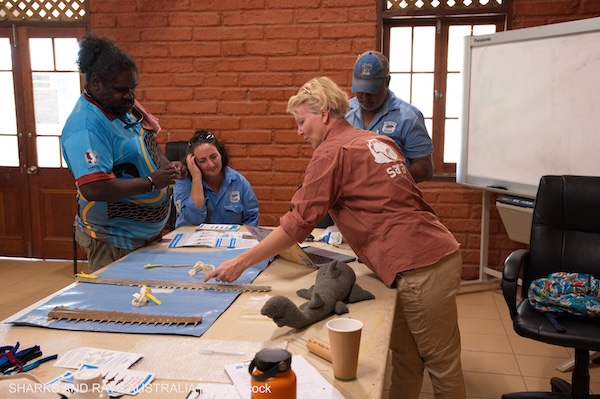
Figure 3: (L) Barbara presents to the community in Coen. (R) Revising sawfish ID with Lama Lama Land and Sea rangers.
This whirlwind trip to Coen, Queensland, marked another milestone in our ongoing effort to involve the entire community in sawfish conservation, whether that’s kids, Traditional Owners, visiting fishers, the Indigenous Land and Sea Ranger program or Queensland Parks. Don’s photographs captured not only the educational aspects of the trip but the cultural significance, helping to build a visual narrative that will resonate with audiences beyond the Cape. This trip would not have been logistically possible without funding from grants like Engaging Science, allowing for citizen science and collaboration between organisations from across the state.
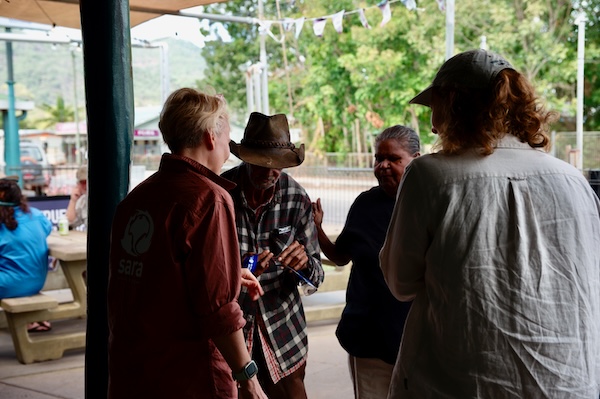

Figure 4: (L) Barbara, Nikki and Alison speak with Brian Ross. (R) from left to right: Lama lama ranger, Alison Liddy, Barbara Wueringer, Nikki Biskis, Don Silcock
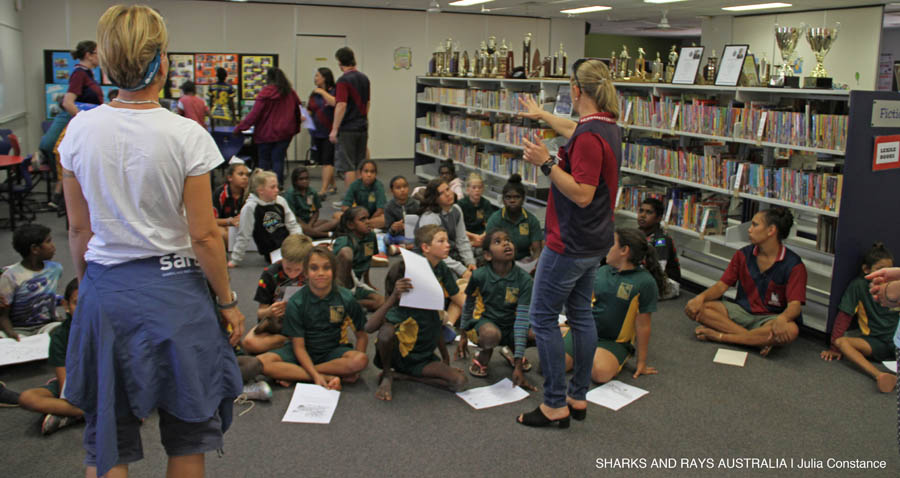
by Barbara | Dec 28, 2018 | Blog
In early November 2018, Sharks4Kids and Sharks And Rays Australia embarked on a joint mission to visit schools around Far North Queensland to talk to the kids about sawfish. Throughout the year, we had finalised developing our ‘North Australian Food Web Game’ and as part of fieldtrips we had already visited the Kowanyama, Old Mapoon and Normanton State Schools. The visits to Kowanyama and Old Mapoon were our second time in these schools, and some of the kids remembered us and how to tag fish, which is fantastic news.
The aim of the school visits is to introduce our work, and the importance of sharks and rays in the local ecosystems, to the kids. We often visit state schools and aim for schools that are off the beaten track. The local Indigenous children often spend time ‘on country’ with their families, often hunting and fishing. Some of their parents work for the local Indigenous ranger groups. But sometimes these parts of their lives are separated from what they learn in school, and so we aim to connect what they see in their free time with ‘boring science’.
I am proud to stand in front of all these little girls and boys as a female scientist. Fieldwork oriented elasmobranch science is clearly a male dominated field, and so every woman in this field is also a #WomenInSTEM ambassador for #GirlsInSTEM. This year, I had 11 other biologists join me on the school visits, and each one of them brought in their own perspectives and knowledge.
For the last visits in November, Paddy Burke, who is currently doing his PhD at Macquarie University, joined me as the representative of Sharks4Kids. Over the duration of one week, we visited schools in Cooktown, Laura, Wonga Beach and Kuranda. Sadly, the Hopevale and Yarrabah state schools did not have time for us. The children that we met were between 4 to 16 years old. In total we spoke to and played the game with 262 students this year. Many of these kids would have never had a chance of meeting scientists before. For example, as the Principal of Laura State School told us, their little town currently sits in the lowest 2% of the socio-economic index of Australia.
Just like, us, the kids love these visits and so do the teachers. Our school visit to the Normanton State School has led to a collaboration in order to develop materials of the life cycle of the freshwater sawfish. During the first term of 2019, the kids will draw these life history stages. The materials will be available on our page, so stay tuned!
This work was supported by the Queensland Government’s Engaging Science Grant, which also allowed us to develop our ‘North Australian Food Web Game’. You can download the game here. It contains colouring in sheets and fun facts of many animals that are found in the rivers of Northern Australia.
The kids from the Laura State School present their coloured in animals from the food web game, together with Paddy from Sharks4Kids and Barbara from SARA
The kids at Wonga Beach State school learn about our research with sharks and rays, including sawfish.
Paddy from Sharks4Kids explains the differences in the four sawfish species that are found in the waters of Northern Australia
A girl from Wonga Beach colours in a saltwater crocodile. Each sheet has facts about the animal on it
During our trip, we were also able to DNA sample some of the saws in private collections
This is my favourite coloured in sheet from our food web game! Some of the kids get really creative while drawing, as visible on this sheet coloured in by a 4-year-old girl from Laura










